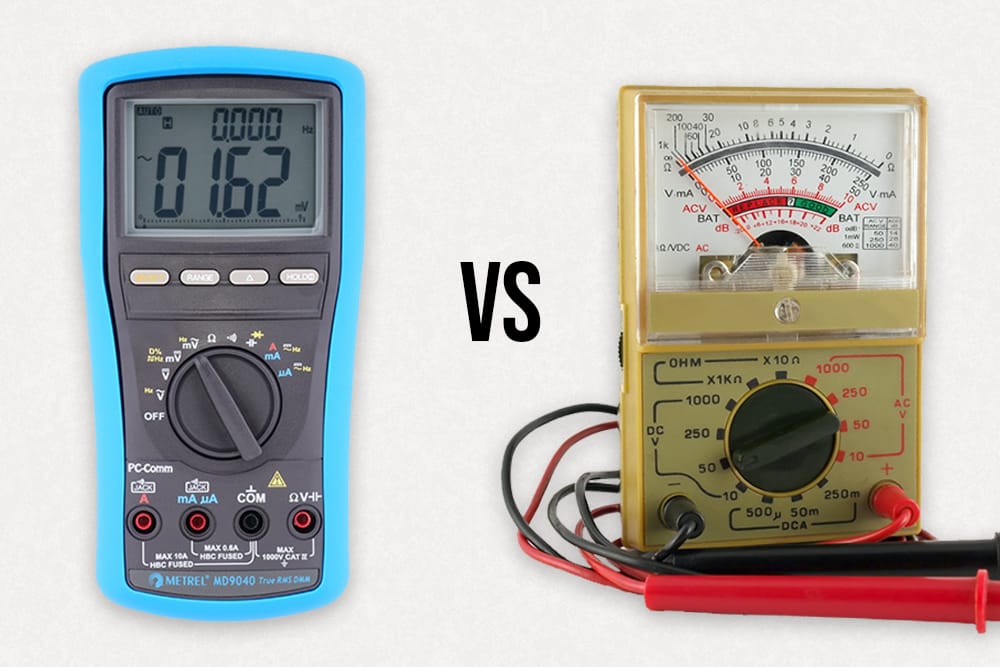The proper equipment is essential while performing electric work. An effective tool for measuring voltage, current, resistance, and other electrical quantities is a multimeter. However, there are two different kinds of multimeter in the market: digital and analog. We’ll explore the distinctions between these two multimeters in this article and see which one is the best that will meet your needs.
Digital Multimeter
Digital multimeter, also known as DMM, is the modern and digital equivalent of the analog multimeter. Beyond the standard voltage, current, and resistance measurements of an analog version, they use a microprocessor to measure and show values digitally with its LED or LCD screen.
One of the main advantages of digital multimeters is accuracy. They can measure values to multiple decimal points and are typically more accurate than an analog multimeter. They are ideal for operations like computer and electronics repair because they require precision.
There are certain features of a digital multimeter that also provide convenience. In general, they are designed to be portable and easy to carry due to their pocket-sized appearance. They also generate measurement results faster because of its technology and they require less frequency in calibration compared to an analog version.
The simplicity of using a digital multimeter is another benefit. They often have advanced features like data logging and auto-ranging, which make taking measurements easier and more effective.
Analog Multimeters
Analog multimeters, on the other hand, are the conventional analog version of multimeters. They measure using a moving pointer and display results on a printed scale. In comparison to digital multimeters, they are less complicated and more affordable, making them a great option for beginners and people on a tight budget.
These types of multimeters do offer certain benefits over digital ones. They are great for fieldwork since they are typically more robust and can survive harsh environments. They also don’t require batteries to work, which means it is convenient to use anywhere and anytime.
However, analog multimeters also have some serious drawbacks. The accuracy issue is among its main disadvantages. They can only measure a limited number of significant digits and are less accurate than digital meters. This can be a significant issue for professional work or exact measurements when precision is essential.
Analog vs Digital Multimeter Accuracy
One of the most important factors to take into account when choosing a multimeter is its accuracy. Due to parallax errors, where the angle at which the user sees the reading might result in mistakes, analog multimeters are not as accurate as the digital one. In contrast, digital multimeters can measure reading with better precision and are less prone to parallax errors.
Analog multimeters can also drift over time, which can lead to errors. When the pointer’s calibration is lost, there is drift, which can cause false readings. However, digital ones are simple to adjust, assuring accuracy over time.
Which Multimeter is Right for You?
The best multimeter for the job will rely on several factors, including budget, level of expertise and the nature of the task you’ll be conducting. An analog multimeter can be the ideal option if you’re new to electric work or on a limited budget. Aside from that they are less complicated and are more dependable to operate since they operate without batteries.
However, a better choice would be a digital multimeter. They present more accurate measurements. They are ideal for operations that highly require exact measurements. A clear reading is better at preventing further issues too.
But again, price should be taken into account. Generally, digital multimeters cost more than an analog, but they come with more advanced features and better precision. An analog multimeter can be the best option if the budget is limited.
It is important to consider personal preferences, experience level and purpose of usage when deciding which multimeter to buy. The ideal option could be an analog if you’re comfortable using analog technology. On the other hand, a digital multimeter is perhaps the better option if you prefer a device with modern technology and better accuracy.
If you’re looking for multimeters or searching for a repair and calibration service for your device, you may request from us a quote or contact us for further inquiries.


